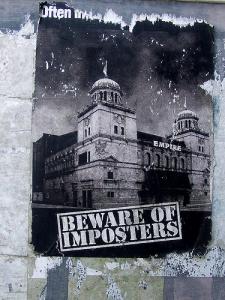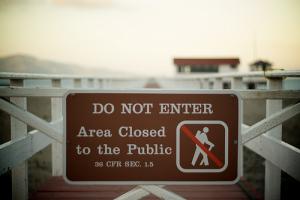
Recently Nathan Barber posted a great piece on why becoming a Professional Engineer is a great idea. He outlined some fantastic benefits that might come to a new PE, but was also realistic that striving for certification needs to be a personal goal at the same time as being something with which to gain external recognition.
Yes, being a professional means that you get letters after your name, and yes it may make getting that next job a little easier, but I'd like to get your opinion on something. Can I venture to say that certification doesn't necessarily make the engineer?
But He's Not An Engineer
I'd like to share a story for anyone who hasn't already heard it. At the beginning of February an engineer in North Carolina filed a complaint against a computer scientist for allegedly producing work that only a professional engineer should produce.
From the article:
Cox and his North Raleigh neighbors are lobbying city and state officials to add traffic signals at two intersections as part of a planned widening of Falls of Neuse Road.
After an engineering consultant hired by the city said that the signals were not needed, Cox and the North Raleigh Coalition of Homeowners' Associations responded with a sophisticated analysis of their own. The eight-page document with maps, diagrams and traffic projections was offered to buttress their contention that signals will be needed [...].
Which seems fairly innocuous to me, notable even, but one engineer took such offense to the work put before him that he felt it necessary to report Cox to the North Carolina Board of Examiners for Engineers and Surveyors:
Cox has not been accused of claiming that he is an engineer. But Lacy [the DOT chief traffic engineer] says he filed the complaint because the report "appears to be engineering-level work" by someone who is not licensed as a professional engineer.
"When you start applying the principles for trip generation and route assignment, applying judgments from engineering documents and national standards, and making recommendations," that's technical work a licensed engineer would do, Lacy said.
He said there is a potential for violation if DOT and the public were misled by "engineering-quality work"- even if the authors did not claim to be engineers.
You can find the complete article here.
Let me get this straight. Cox did not claim to be an engineer. His team merely completed an analysis using sound engineering concepts and produced a report of those findings. Isn't that something that should be praised? Don't we spend a huge amount of time and effort trying to get the public to understand engineering, to engage with engineering and to respect the work we do?
Even looking past that, shouldn't the focus be on the content? If a population thinks that something is unsafe - and is willing to go to great effort to prove their belief - then don't we, as scientists, have a duty to approach the content of their appeal with skeptical appreciation of their methods?
Moderating Exclusivity
I understand (and fully believe) that professional disciplines need to be monitored for the greater public good. Registration of professionals affords a level of security that those taking on public responsibilities are adequately qualified to do so (through a combination of training and experience).
I also believe it is important that the correct training and foundations go in to being a good engineer. Just as I'd only go to a doctor with a degree or a lawyer who'd passsed the bar, there are some elements of engineering education which are essential to calling yourself a professional engineer. But Cox didn't claim to be an engineer.
Does communicating a good idea merit a scolding from the Board of Education for trying to be a teacher? Does cooking a gourmet meal call for a finger-wagging from the Professional Chef's Association for impersonating a chef? Does writing this post mean that I should be reported to the National Association of Science Writers for doing the work of a science reporter while not being registered as one?
-

- Do Not Enter by DimitryB on Flickr
I'm sure you can tell where I currently stand on this debate, but I'm incredibly interested in your opinions. Being a professional engineer carries weight. It means that you have established yourself as a professional in your field with the ability to practice your trade and carry liability. My opinion is that badly done engineering by a trusted professional engineer would certainly be a threat to our profession, but I draw the line at criticizing good engineering done by a non-engineer. In this age of ubiquitous information, though, do you believe that professional status also carries the right to be exclusive about the information which you learned to get there?
Where do you stand on the professional debate? Do you believe that there should be limits on who uses engineering principles?
Related articles
- Top 5: Reasons to Get Your P.E. as a Chemical Engineer (chenected.aiche.org)



Comments
This is a great point. Being licensed grants you a lot more responsibility and maybe more respect - but everyone should be careful not to get too high up that horse. At least we should be able to recognize good work when we see it. If your only defense against some one else's proposal is that they don't have the right piece of paper hanging on their wall - I think that is an acknowledgment that they did a good job. This would be a totally different argument if the guy was claiming to be an engineer or stamped drawing or paperwork. But with the facts as they stand, this shouldn't even be a discussion.
I certainly agree that it'd be worth discussing if he'd actually used the title - to garner credibility, support or otherwise - but as it stands it seems as though the man should be congratulated for executing a good analysis. I love that you take the DOT engineer's criticism as confirmation of a job well done! The engineers' licensing board will be investigating Cox for “practicing engineering.” I wonder if “practicing engineering,” as governed by the board, needs to be defined as both the use of engineering tools/techniques and the claim to the title of engineer together.
As the individual apparently did not present himself as an engineer nor did he present his paper as being completed by an engineer all he did was what most of us (i.e. citizens) do not have the drive to do for ourselves. That is to present our opinions and beliefs in a well documented and thougthout argument that might actually support what we are encouraging be done. This appears not to be a "we should have lights because someone might get hurt without them" or other emotional arguement but a well worked out reason and solution. On the other hand, if he were to present this as a professional engineering study and himself as an engineer working for someone else then he should be investigated.
You raise a good point regarding having the drive to put together an objective analysis, Dale. It’s not something that many citizens would put the time and effort into executing (unfortunately). Perhaps if the status-quo for citizen complaints were of a higher standard, then this would have been more of a non-event.
[...] This post was written for ChEnected. That (slightly modified) version can be found here. [...]
[...] certified engineer laying claim to ownership of a specific class of engineering problem. The post I’m referring to is here and a follow up and slightly altered post is here. Both posts are worth a quick [...]
One thing that I really became aware of when consulting and is part of the PE process, is that one has to document and talk to peers when asking for recommendations. This can be a reality check as far as work perception goes. What I think the story points out is how the ego of the engineer, organizations (e.g. DOT), and bureaucracy can get in the way. There seems to be quite a bit of literature available on the topic of how corruption can get in the way of providing for efficient and effective delivery of infrastructure services. The part that is not openly accepted by the engineering community is that the public has a significant voice, one that sometimes dictates the applied engineering analysis. Keep in mind, to some degree with engineering as well as on the open market, you get what you pay for, therefore one of the reasons for a rigorous process such as professional licensure. Bums me out to read this story, seems like the local government didn't give proper attention to a public concern.